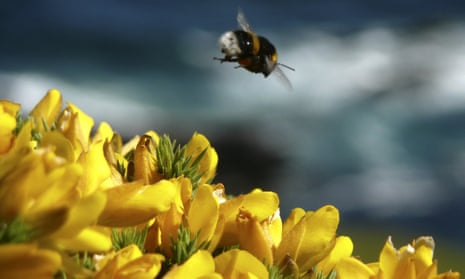It’s great that Michael Gove has accepted the overwhelming scientific evidence that neonicotinoids are killing bees, other insects and birds, although it is a sad commentary on how safety decisions on pesticides have been taken up to now (Plan bee – Britain to reverse opposition to ban on colony-killing pesticide, says Gove, 9 November). The fact is that the political and economic power of the chemical industry have had far more influence than the results of independent scientific research.
Michael Gove says that there “may be a case for going further” than the current temporary ban on three neonicotinoid sprays and their use on only some crops (The evidence points in one direction – we must ban neonicotinoids, 9 November). He is right – all neonicotinoids should be banned because research shows they are getting into wild flowers, turning what should be safe havens for bees and butterflies into potential killing fields. Research led by Professor David Goulson of Sussex University, part funded by the Soil Association, found that some wild flowers in the margins of crops on the edge of fields actually contained more neonicotinoids than the sprayed crop.
Peter Melchett
Policy director, Soil Association
As a farmer, l am not at all disappointed that a pesticide that has proved excessively residual, and which harms beneficial insects, is to be banned (Give bees a chance, 10 November). However, I am alarmed that such a ban is to take place without any consideration as to its replacement. If food prices do not rise to compensate for lower crop yields, then farmers and gardeners must turn to the first new pesticide that does the same job without harming bees. If it kills midges instead, then no one will notice until insectivorous birds start starving to death. By then, it might be too late. Agricultural policy needs expert agronomic, ecological and economic understanding, not just political opportunism.
Huw Jones
Pwll-Trap, Carmarthenshire
If only we dared to hope that Michael Gove’s aims of banning bee-killing agricultural sprays can be followed through with a comprehensive commonsense package of government measures for the countryside. There can be some positive post-Brexit opportunities to be found, exemplary animal welfare for one. I would like to see a two-tier trading tax on animal exports so the price of live animals for slaughter abroad becomes greater than those humanely killed here for export chilled. Result, fewer lorries crossing the channel and better-quality meat from animals which have not been stressed. Simple.
Deb Nicholson
Barrow Gurney, Somerset
I write following the article by Baskut Tuncak (The EU and glyphosate: it’s time to put children’s health before pesticides, 6 November). I am the director of public affairs for the European Crop Protection Association, the organisation that represents 22 companies in Europe which manufacture crop protection products – or, in popular parlance, pesticides. I am also a husband, a son, and most importantly a father. The central idea, put forward by Mr Tuncak, that in essence our industry and the system that regulates it overlooks the potential impact of pesticides on the health of children, does a disservice to the 26,000 people who work for our industry in Europe, many of them also mothers and fathers – people who get up every day and do a job that they fundamentally believe is making a positive contribution to answering some of the major challenges we face as a society. The reality is that we are living longer, healthier lives than ever before. In Europe we can proudly say that we have access to the safest food in the world. As mothers and fathers we all devote our lives to protecting our children. Perhaps Mr Tuncak might reflect on this for his next article.
Graeme Taylor
Director of public affairs, ECPA
Damian Carrington’s analysis is spot-on: a shift to plant-based and clean meat will be our most powerful way to combat global warming (‘There is reason for hope’, 8 November). But the climate impact of plant-based and clean meat is only the tip of the iceberg. Research by UN scientists found that the way we currently raise animals for food is one of the top contributors to every single one of the most severe environmental problems plaguing us – from water pollution to desertification to deforestation to biodiversity loss. Perhaps the greatest threat from animal agriculture is the widespread use of antibiotics on filthy factory farms, which is leading to more and more antibiotic-resistant superbugs that could cost the world £75tn by 2050. A review by the UK government found that the threat to the human race from deadly new drug-resistant disease strains is “more certain” than that from climate change.
Plant-based and clean meat will end all these threats. No wonder even mega-meat-producers Tyson Foods and Cargill are investing.
Bruce Friedrich
Executive director, The Good Food Institute
Join the debate – email guardian.letters@theguardian.com
